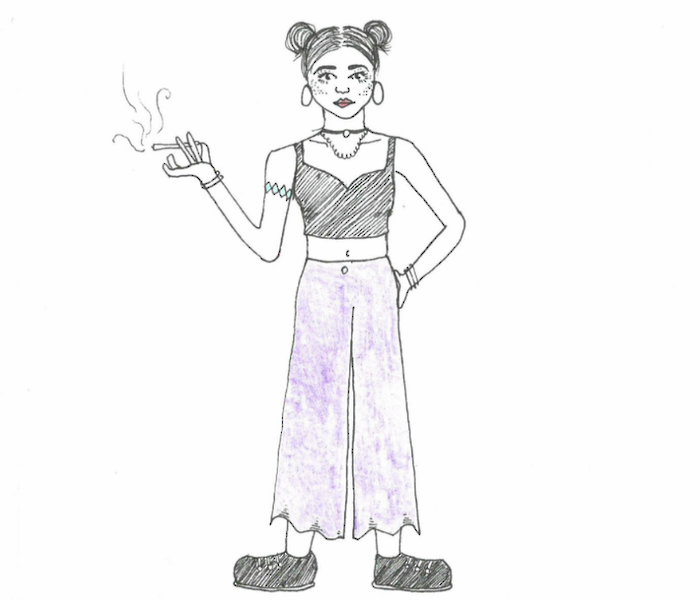
We need to keep talking about Hetty Douglas
In her discussion of Hetty Douglas’ actions, Lizzie Bowes unpacks the role of cultural fetishisation in Cambridge society
Hetty Douglas’ name – and the scandal recently associated with it – is by now probably old news. The artist came under fire last month after she posted an Instagram story mocking two builders, whom she claimed “look[ed] like they have one GCSE”. The story was reposted on Twitter and subsequently went viral. There was immediate outrage, and as a result Douglas was forced to retreat from social media, before posting a half-hearted apology letter online in which she had the audacity to lament the backlash she had received. She has since faded into comparative obscurity, but the conversation that she started cannot die down. Douglas’ astonishing display of ignorance, and not to mention her extensive appropriation of working class culture, are indicative of a wider social issue.
Douglas made a huge mistake. Some people have even rushed to her defence, claiming that she is of a working-class background herself. In itself, this is a poor excuse. Working-class or not, she still capitalises on the romanticised perception of working-class culture in order to sell her art. But I’m less interested in the actual error she made than I am in how easy it was for her to make it – how easy it was for her to, without a second thought, undermine two members of that social class to whom she arguably owes a great deal of her artistic success, and assume the role of a sneering, privileged superior. For people who obliviously appropriate working-class culture, it is really that easy. You can put on your Air Maxes and try to assimilate into this world, this world that seems so cool to you, this world of cool music and eccentric slang and edgy tracksuits, but as soon as you take off your wavy garms your connection to the working class and its genuine issues (poverty, social stigma, unequal access to education, to name a few) is also removed. This fascination with working class aesthetics, culture and sociolects does not translate to an earnest concern for the political and socioeconomic inequalities that distinguish actual working-class people from their middle- and upper-class counterparts, and the uncomfortable injustice of this is something that needs to be continually called out.
"You can put on your Air Maxes and try to assimilate into this world, this world that seems so cool to you, this world of cool music and eccentric slang and edgy tracksuits, but as soon as you take off your wavy garms your connection to the working class and its genuine issues is also removed"
Working-class appropriation is something I’ve been thinking about a lot lately, especially in terms of clothing. It’s not unusual to see white, ostensibly middle-class teenagers, especially in Cambridge, dressed head-to-toe in Nike and being praised for their fashion sense, while black men in London wearing the same clothes are likely to be racially profiled, stereotyped and perceived as 'thugs'. But crucially, I don’t think the wearing of the clothes is the issue at all. If you’re rich and want to wear trainers or a tracksuit every day, go for it. That’s not the issue in itself. It is when people fail to recognise that the clothing they adopt as a novelty, or for aesthetics, actually means something. They fail to see what it represents to the people who originated it in a politicised struggle, in order to be taken seriously and treated with respect - that is when it becomes appropriation and ignorance. When you are influenced by the culture of people inherently less privileged than you, you need to compensate for that by lending your voice and your own privilege to advancing causes that challenge social inequalities. Because your seemingly innocent wavy garms cannot be worn ethically without acknowledging the imbalance of power that creates.
People from immensely privileged backgrounds are quick to put on their sliders and drop “peak”, “rah” and “fam” into their conversations over brunch, but where are these people at university access events? Where are they campaigning against cuts to child tax credits or the shutting down of public libraries? If you instantly, as Hetty Douglas did, assume that a construction worker is uneducated and unintelligent but are the first one raising your gun fingers in the air when rap music is played or spending all of your money on Urban Outfitters’ extortionate rip-off puffer jackets, you are part of this problem. You are using your privilege to assert your own clothing choices and behaviour as worthy of acclaim and praise, whilst denigrating the people who inspired those choices. Paradoxical as it sounds, it is possible to love working-class culture but be inherently disposed against working-class people, as Douglas’ internalised disgust for the working class who inspired her art has exemplified.
Frankly, despite a lot of opinions on this topic, there is no solution to this problem. The lines between appropriation and well-intentioned appreciation are thin, but it is clear that this cannot be used as an excuse any longer. We need to start talking about the fact that there must be intersections between the influence of working-class culture and advocacy of working-class issues. Most importantly, we need to keep this conversation going until it becomes more than a topical issue, swept under the rug when the latest scandal has died down

